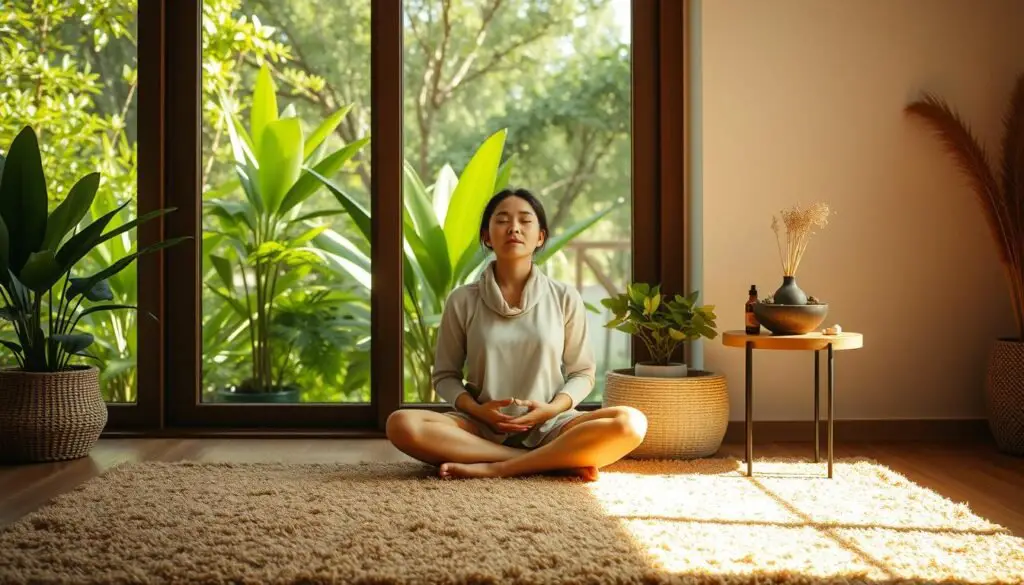Looking for natural sleep aids? You’re not alone. More and more people today want to enjoy deep, restful sleep without relying on pills or medication. That’s no surprise—good sleep plays a huge role in how we feel, think, and function.
When you don’t sleep well, it shows. From constant fatigue and mood swings to poor focus and stress, the effects can touch every part of your day. The good news? There are natural ways to support better sleep.
In this guide, you’ll find simple, practical steps to help your body relax, reset, and fall into a more restful rhythm. These gentle changes can help you wake up feeling truly refreshed and ready to take on the day.
Summary
Simple, natural ways to improve sleep quality
Better rest for improved physical and mental health
Drastically cut back on sleep aids and other medications
Start the day with energy and productivity from a good night’s sleep
Enjoy deep sleep without much hassle
Why Natural Sleep Solutions Matter
Sleeping naturally solutions offer a sustainable tack to improving the quality of sleep. This, unlike sleep medications that are fraught with potential downsides. As an individual looks to enhance their sleep, it is crucial to understand the disadvantages of pharmaceutical sleep aid and the benefits that come from going the natural way.
Sleeping pills may give a patient temporary relief but pose a high risk to dependence and various side effects: a commonly felt drowsiness and dizziness and in other cases rather severe reactions. The reliance on sleep medications might impede the body’s natural way of ensuring the accurate timing of sleep and hence bring about a sleep disorder in the end.
Risk of developing dependency
Side effects including drowsiness and dizziness
Impact on the body’s natural sleep cycle regulation

Advantages of Natural Sleep Remedies
On the contrary, natural sleep remedies generally endorse good sleep patterns without the side effects tied to sleep medication. These methods work at improving deep sleep quality so that general wellness will also be improved. The use of natural sleep solutions can recommended a regular sleep pattern and make a sleepy atmosphere.
Key benefits include:
Higher quality of deep sleep
Higher level of overall well-being
Non-addictive sleep regulation, having learned to sleep without artificial enhancements, letting a patient develop more regular sleeping patterns. This makes the natural treatment option more favorable than pharmaceutical sleep drugs.
Ease of Sleeping Without Using Artificial Aids for Long-Term Use
User-friendliness: Since it is used for a relatively short duration, it’s far less of an imposition on patients than remembering to take a pill every night
Keeping in mind that artificial flavorings and quick fixes can conduct the body back and initiate severe allergic reactions in patients, the general intended line of treatment is always to keep things as natural as possible.
Interpretation: End of the text does not end with question marks as there aren’t any question marks at the end of the original text.
Sleeping cycles and sleep play an important role in getting refreshing sleep, which helps in both physical and mental recovery. The complete picture of these factors is necessary for managing problems with sleep quality.
The Four Stages of Sleep
Sleep is not a uniform state, but rather, it is only best described as a dynamic process involving several stages. The sleep cycle usually contains four stages. The first three of these stages are categorized as non-REM sleep, while the fourth is known as REM sleep. The third stage is the deepest or what is referred to as slow-wave sleep because brain waves slow down, making it hard to wake up.
Quality sleep means deep sleep for physical renewal, the consolidation of memories, and the maintenance of emotions. This includes the repair and rejuvenation of tissues, the building of bone and muscle, and the strengthening of the body’s defense system in maintaining optimal shapes and functioning. It also plays an important role in mental processes, such as intelligence and relating emotional activities.
Quality sleep may be disturbed by such factors as unsuitable sleep conditions, stress, and insufficient sleep. The global burden of disease indeed points to depression and anxiety as significant contributors to sleep disturbances. Creating a conducive environment for sleep and using techniques for relaxation will help in overcoming such barriers.
Optimizing Bedroom Temperature: The first of these basic hacks to take us to deep sleep is to do with the temperature in the bedroom.
Sleeping quality improves when ambient lighting is minimal. That’s why it’s ideal to keep the temperature inside the room cooler, within the range of 65- 68°F. This will help the body naturally follow its circadian sleep-wake cycle and thus have a better, more restful night’s sleep by lowering metabolism and easing relaxation.
Allowing your sleep to be influenced greatly by whether you can fall asleep or stay asleep. How to Optimize Light Control: To create such conducive sleep conditions is therefore imperative to effectively handle light, as will be illuminated in the instance of: Using blackout curtains or shades to stop external sources of light Dimming or turning off lights at night so that your body can recognize that it is time to sleep Not watching TV or using any screen before going to bed, not even bright lights
Noise is, of course, one of the greatest disruptors when it comes to allowing people to sleep. For optimal sleeping conditions, consider the following:
Earplugs or earmuffs to minimize noise disruptions
Install soundproofing elements in your bedroom
White noise app or machine that makes continuous soothing sounds
White noise machines are indeed quite good for the sleep environment for a human being. They do so by creating an ambient channel of frequencies that generally cover or hide other disrupting noises, enabling you to get sleep quickly at night and stay asleep more soundly. You may get them available in the market as rain, surf, or even fans.
Adding mass to walls and ceilings sealing gaps around the doors and windows and using materials that absorb sound such as acoustic panels all contribute to soundproofing the bedroom.
Implementing these strategies helps in creating a sleep conducive environment for deep and restorative sleep.
Establish a Consistent Sleep Schedule
Having regular bedtimes and wake times requires attaining deep, restorative sleep. This is all about creating a routine that your body can rely on, even on weekends.
Keep a regular bedtime and rise time. That can help set your internal body clock, so falling asleep becomes easier, getting up refreshing. The bedtime should let the sleeper accumulate 7 to 9 hours of rest to be well-rested for the next day.
It’s tough to keep your sleep schedule on weekends, and it’s probably one of the hardest things to do. It’s best not to let your sleep time diverge from your Monday to Friday schedule by more than an hour either way.
Helping Your Body Slowly Adapt to the New Time
If you have to reset your sleep schedule, do it slowly. Change your bedtime by 15-30 minutes every few days so it’s not very disruptive to your body in helping it adjust.
This minimal change every few days helps your body to adjust without feeling so disrupted and supports the maintenance of a consistent sleep schedule.
Improving the consistency of your sleep schedule enhances sleep quality, boosts overall well-being, and helps you wake up feeling more refreshed for the day ahead.

Create a Relaxing Bedtime Routine
Rewritten Text:
Having established an effective and calming pre-sleep routine will calm the quality and duration of sleep. Here’s what’s known vs. what needs to be understood about relaxation and sleep quality:
Effective pre-sleep activities that facilitate relaxation include:
Reading: Letting oneself become absorbed in a book is a great way to de-stress. Choose something not so engaging or exciting since the idea is to relax not to stay up.
Baths: Being immersed in warm water will help to release all the tensed muscles in your body, and mixed with lavender scented oil will relive your mind as well.
Reading an actual book before going to sleep helps to get off the screens and unwind in a more relaxed way. The recommended book is not one that’s captivating, rather quite the opposite—it should draw one into sleep.
Taking Warm Baths
Taking a warm bath is perfect for relaxation, provided the water’s warm enough and you’ve added some scents of lavender or chamomile along the way.
Mindfulness and Meditation Practices
Relaxation and the Power of Mindfulness and Meditation. Not only do mindfulness and meditation apply powerfully to relaxation in general, but going through a practice of one or both prior to bedtime can ready the mind and body for sleep.
Stretching Exercises for Sleep. Gentle stretching helps release muscle tension and relaxes your muscles. Focus on gentle, slow movements – they should relax rather than energize you.
Step4: Diet and Eating Pattern Monitoring
It is a very important step in diet and eating pattern monitoring to improve sleep quality. What you eat and when you eat can play a role in supporting or preventing a deep, restorative sleep from happening.
Foods That Help You Sleep
Eating certain foods can help one sleep better. These include: Turkey and Chicken since they are rich in tryptophan that enforces the production of serotonin and melatonin for the control of sleep. Fish; fatty fish, for instance, salmon is good for vitamin B6 and magnesium which are sleep critical Nut and Seeds; like almonds, walnuts, and chia seeds play a double role by providing melatonin alongside magnesium for sleep.
Dairy: Some dairy products contain tryptophan and calcium, which are known to help ease the body into sleep.
Complex Carbohydrates: Whole grains increase serotonin levels and, as we have just learned, promote relaxation.
Foods and Drinks to Avoid Before Bed
Just as some foods can help sleep along, others can easily disturb it. Avoid, or only have in limited quantities:
Caffeine: In coffee, tea, some soft drinks. Caffeine can remain in your system for hours and interrupt your sleep.
Alcohol: It may help you fall asleep at first, but later on in the night it can keep you from sleeping well.
Spicy and Heavy Meals: If you have spicy and heavy foods at night, right before you sleep, you may develop discomfort along with indigestion, both posing barriers to falling asleep.
Timing your final meal is very important. If you eat too close to bedtime, it may result in poor quality of sleep because the body does not digest well at night. It should be 2-3 hours before bedtime so that the food can properly be digested and the chances of disrupting your sleep are reduced.
Being mindful of your diet and eating patterns can help you take a big step for better sleep. Along with this, adjusting the diet will also include other strategies that promote sleep thereby making the quality of sleep better.
Exercise Regularly to Sleep Better
Making exercise a part of life can help people who has troubles with sleeping. Physical activity is very important for good quality sleep; if done in a right way, it can make the whole wellness journey much better.
Top Kinds of Workout for Sleep Quality
The quality of exercises varies in their ability to make one sleep better. Aerobic workouts like walking, cycling, and swimming are very good in improving the quality of sleep. They help to regulate the body’s internal clock and deepen the sleep stages. Also, resistance training can do so because it reduces stress and anxiety which normally act as barriers to falling asleep.
Ideal Time for Physical Exercise
Exercise timing is important for its effects on sleep. While it is true that in general, physical activity is good, one should avoid vigorous exercise within 2-3 hours of bedtime since it would stimulate the body and delay sleep. A relaxing activity or a light stretch in the evening could help signal to the body that it’s time to wind down.
Regular exercises can drastically improve the architecture of sleep by raising the levels of deep sleep and REM sleep. Deep sleep is mostly needed for bodily restoration, while mental recovery is achieved through REM sleep. Therefore, making the body active physically on a regular basis would raise the quality of Sleep you get to have and also how refreshed you feel when you wake up.
Manage Stress and Anxiety
To get deep sleep first deal with stress and anxiety. Controlling these things will make the quality of sleep better which in turn makes overall health better.
Evening Journaling Tips
A good way to lower stress is evening journaling. Write your thoughts and feelings, process your day, clear your mind before you go to sleep. This can help find and let go of held-back emotions or worries.
Journaling should begin by setting aside a few minutes each evening to write about what has happened that day, things one is grateful for, or whatever else there is in the heart to say. It can eventually become a healing practice that quiets the thoughts.
Breathing Techniques for Sleep
Breathing exercises are another very powerful tool. There is diaphragmatic breathing, and there is also the 4-7-8 method which slows down the heart rate and calms the nervous system, making the body ready for restful sleep.
Try this simple 4-7-8 Breathing Exercise: Inhale through your nose for 4 seconds. Hold your breath for 7 seconds. Exhale through your mouth for 8 seconds. Repeat this cycle a few times to feel the calming effects.
A cognitive behavioral technique helpful for managing the thoughts that generally run in the mind during sleep and prevent sleeping. The two that are highly effective are thought stopping and worry time scheduling.
Thought Stopping
In this technique, you first acknowledge the thought that is creating you stress and then tell yourself to stop thinking about it. For example, you can say to yourself “I am not going to think about this now” and then redirect your focus on an activity that makes you calm or simply on your breath.
Worry Time Scheduling
Another technique is Worry Time Scheduling. In this, you allocate a specific time in the day for worrying or thinking about stressful issues. If you contain your worries to a specific time, they would not intrude on your sleep.
By making these stress management techniques part of your daily routine, you can greatly improve how easily you relax and get ready for a good night’s sleep.
Limit Screen Time and Blue Light Exposure
Screens emit blue light that can seriously affect our sleep in trying to calm ourselves to sleep. With increased usage of digital devices in day-to-day living, knowledge about the effects of screen time on sleep becomes a necessity.
The Science Behind Blue Light and Melatonin
Evening exposure to blue light can inhibit the secretion of melatonin, the sleep hormone. Normally, in humans, the production of melatonin is induced by darkness and inhibited by light. Constant exposure to blue light from these screens tricks our brains into thinking there is still daylight and keeps us awake.
Digital Curfew Strategies (1-2 Hours Before Bed)
A digital curfew is the setting of a specific time at which one stops using screens prior to bedtime. Try to avoid them for at least an hour before sleeping; ideally, it should be 2 hours if possible. A pre-bedtime routine without screens will do a lot to improve the quality of sleep.
Tech Tools and Settings for Better Sleep
There exist many tech tools and settings to help reduce blue light exposure. For instance, most of the modern devices have built-in settings whereby the filter of blue light can be applied during certain times of the day. For example, Night Shift for iOS devices and Night Light for Android devices can adjust the color temperature of your screen to help reduce blue light emission. Other apps like f.lux may automatically adjust the colors on your screen based upon time and date.
Controlling screen time and lowering blue light exposure helps people support their body’s normal sleep pattern and get better overall sleep quality.
How to Sleep Better: Natural Sleep Remedies and Sleep Tips
To make sleep even better, lots of people try natural sleep remedies and tips. These natural ways can go along with the basic steps for better sleep and give more relaxation and calmness.
Herbal Teas and Natural Supplements
Herbal teas, chamomile and lavender for example in the balance of flavors, are known sensitivities for their relaxing effects. Teas give one an opportunity to lift stress and prepare the physique for rest. Supplements such as melatonin and valerian root come from nature and are common additions to sleep-promoting regimens. However, one should always seek medical advice before adding any supplement to his regimen.
Among some of the best herbal teas for sleep, chamomile tea is one lavender tea another and a third is valerian root tea.
Herbal TeaBenefitsChamomileTeaReduces anxiety and relaxes musclesLavenderTeaCalms the mind and bodyValerian RootTeaImproves sleep quality and durationEssential Oils
Aromatherapy with oils like lavender, bergamot one can achieve better sleep quality. It can be diffused in the air for relaxation or applied on the body to relax oneself. The relaxing scents can help in reducing anxiety and tension therefore making it easy to fall asleep.
Some of the best ways how one can use essential oils for sleeping are:
Place in the room
Add a few drops to a warm bath
Apply diluted oil to the skin
When to Seek Professional Sleep Help
Just as with the natural remedies for sleep, in case of persistent issues with sleep, professional intervention would be better. If you are not able to get proper sleep even after using different remedies then consulting a specialist for sleep apnea would be ideal. This will help discover any underlying issues and get a specific plan for better sleeping.
Symptoms that you might require expert assistance comprise:
Chronic sleeplessness
Overtiredness during the day
Loud snoring or breathing problems while sleeping-
Conclusion: Your Customized Way to Profound, Healing Sleep
Obtaining deep, healing sleep is a path that includes learning about and applying different methods. By adhering to the 7 easy steps discussed in this write-up, you can make a personal sleep schedule suited to your unique wants.
Setting a regular time for sleep, making a calm routine before bed, and cutting down on screen use are some of the ways that can help better the quality of sleep. By putting these methods together, you can raise how good your sleep is and wake up feeling fresh and full of energy.
Making the place nice for sleep, watching what you eat, and dealing with worry are also key parts in getting good sleep. By taking charge of these things, you can make your sleep better and enjoy the good parts of healthy sleep.
Begin your path to better sleep now by using these tips and changing them to fit your own needs. With hard work and time, you can get the deep, fixing sleep you need.
FAQ
Some simple steps to achieve deep sleep without pills are: Creating a comfortable place for sleep, going to bed at the same time every day, having a calm routine before bed, watching what you eat and when you eat, getting regular exercise, dealing with stress and limiting screen time plus blue light.
How do I make a place that is good for sleeping?
Controlling the room where one sleeps to be between 65-68°F, taking care of light and keeping it quiet with things like white noise machines or soundproofing can make a nice place for sleeping.
What are some good things to do before sleep to help me relax?
Reading real books, taking warm baths, doing mindfulness and meditation, and gentle stretching are good ways to relax before sleep and get the body ready for good rest.
How does what we eat affect our sleep?
Eating foods that help with sleep, not having foods and drinks that mess up sleep before bed, and timing the last meal so it gives enough time to digest can support goals for good sleep and make health better. Can normal exercise make sleep better? Yes, adding the right kinds of exercise into your daily life, at the best time, can help the way you sleep and make overall sleep quality better.
What are some natural sleep remedies that can enhance sleep quality?
Herbal teas, natural supplements, and essential oils used in aromatherapy for relaxation will generally promote better quality of sleep.
How does blue light exposure affect sleep?
Screen blue light kills the melatonin inside you and makes it harder to get asleep. A digital curfew and tech tools for limiting blue light are ways to help minimize the impact
After trying everything in the natural sleep remedies and strategies, if you still have trouble falling or staying asleep, then it may be time to seek professional help to address sleep issues.


